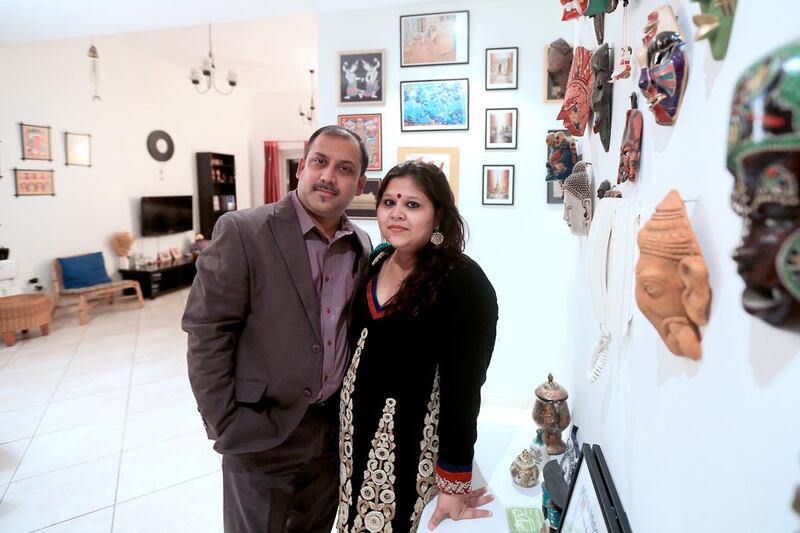When Kapil Jain wanted to buy a three-bedroom property in Pune, he found signing up for a home loan in India a daunting process.
Mr Jain, 40, a digital marketing technologist in Dubai who hails from Lucknow in north India, was fortunate to have friends who could advise him.
“I went with word-of-mouth and with recommendations from a few of my financial consultant friends working for Indian banks,” explains Mr Jain, who wanted the property as a future home. “Since I was banking with Axis Bank I went for the home loan with them. Another reason was the property builder was listed with the bank, which also gave some confidence.”
Mr Jain made a trip to India to secure the mortgage for 3.6 million rupees (Dh212,000) on the 6.8m rupee property – a process that took two weeks.
He took out a five-year loan in 2011 – in a bid to clear the debt quickly – with a two-year fixed rate of 11 per cent. After the two-year fixed rate expired, the interest was calculated on a floating basis, going up to 11.75 per cent.
Despite eventually gaining approval, he warns that securing the mortgage was a “tedious” procedure.
Many UAE-based non-resident Indians (NRIs) are currently investing in property in India amid optimism surrounding the economy and a weak Indian rupee. While some buy for investment, others buy to help support family members or as a future home for themselves.
“NRI customers have a big share of the premium and luxury home market in India,” says Praveen Kutty, the executive vice president and head of retail and SME banking at DCB Bank, an Indian lender. “Given the depreciation of the Indian rupee, it’s becoming easier for NRIs to afford their home loan EMI [equated monthly instalment].”
But for those without cash to buy outright, taking out a mortgage is the only option to complete their purchase.
And just like resident Indians, expatriates must prove to the lender they can repay the loan.
“The NRI should be able to provide the bank the evidence of sufficient disposable income to service the home loan, stability and security of his employment and income through a steady stream of remittances,” says Mr Kutty.
Documents required normally include a salary certificate and employment contract, passport and visa copies and bank statements.
“Evidence of any financial investments such as fixed deposits or mutual fund investments et cetera can further validate the customer’s repayment capability. Since the NRI resides in a country where India’s laws might not be applicable, the bank at its discretion might also ask for a local guarantor.”
Indian expats should have an NRI bank account before securing a home loan, adds Mr Kutty. “As long as the customer is able to establish his creditworthiness, it is not very difficult for an NRI to take a home loan. Identifying a good property in a location of choice in a specific budget and completing the documentation required for the property purchase and the loan will be the bigger hassle.”
The current weak rupee is a major advantage to homebuyers from the UAE, but those taking out home loans must be prepared for future currency fluctuations that could work to their disadvantage.
Sakthi Prakaash, the lead research analyst at WealthRays Securities, a broker and research firm in Bangalore, says that currency issues are “one of the most important criteria NRIs should look into before they buy properties in India”.
But investors have other factors to consider such as who will manage the legal affairs in their absence.
Anuroopa Mukherjee and her husband, Kaushik, took out a 15-year home loan of 1.9m rupees with the Indian bank HDFC in 2012 at a rate of 11.25 per cent to buy a 3m rupee two-bedroom apartment in Kolkata.
“The property was approved by HDFC so we just went ahead with them without doing much research with other banks,” says Ms Mukherjee, 35, who owns a public relations and marketing company in Dubai. “We felt it would be a better choice as they have a rep office in Dubai.
“We chose the property in Kolkata and applied for loan there itself. We assigned my brother’s younger bother as the power of attorney so he could complete the formalities in our absence.”
Lenders will often demand that the NRI gives power of attorney to someone in India and some banks insist that this person should be a close blood relative.
However, a number of major lenders have offices in the UAE, so it is not essential for an NRI to go to India to secure the loan.
“For submitting the income proof and other documents, we have our relationship managers stationed in GCC countries, who can collect such documents from the applicants,” says KA Babu, the deputy general manager of retail business at Federal Bank, headquartered in Kerala.
As well as income, banks are also concerned about educational qualifications, commonly demanding that customers seeking loans should be graduates.
Sankara Srinivasan, the chief operating officer of Realtycompass.com, says buyers should look carefully at the fine print when it comes to choosing a loan “to avoid any surprises further down the line”.
And don’t ignore the interest rate. These are far higher in India than the UAE, but taking out a home loan from a UAE bank to buy property in India is not an option offered by local banks.
However, some NRIs take out personal loans to help cover a deposit on an Indian property.
“Sometimes personal loans in those countries [such as the UAE] are far cheaper, so people do take unsecured personal loans to whatever extent possible and then the rest of it will be taken up through a home loan,” says Mudassir Zaidi, the national residential director at the property consultancy Knight Frank India.
“It would be at much lower interest rate, but the amount wouldn’t be very high. Generally people will not be able to fund the entire purchase through that.”
With interest rates on home loans so high in India, Ms Mukherjee suggests considering other funding options. She and her husband decided to pay off their entire home loan last year as early repayment came without any fees or penalties.
“I feel if you have the cash then it’s better not to take any loan,” she adds. “You can go for construction-linked plans or other schemes that builders come up with where you only need to shell out money in instalments. That way you save on the bank interest.”
The lowdown on home loans for Indians abroad
What is the best way for NRIs to compare home loans in India?
There are several websites that allow NRIs to compare home loans, including BankBazaar.com, ApnaPaisa.com and policybazaar.com.
Are there significant differences between loans offered to NRIs and those offered to Indian citizens?
Interest rates are generally similar. The biggest difference is probably the tenure of the loan. NRIs are typically awarded loans for up to 20 years, while resident Indians can get loans for up to 30 years.
What are the requirements and fees?
ICICI Bank, for example, demands that salaried NRIs in the UAE have an annual income of at least Dh36,000 to secure a five-year loan and earn at least Dh48,000 for a six or 10-year home loan. The requirements are higher for self-employed NRIs. It charges a processing fee of 0.5 per cent of the loan amount and services tax and surcharges are added to that. For loans of between 11 and 15 years, the bank demands a diploma or graduate minimum educational qualification with a minimum of three years of employment abroad or professional qualification with one year of employment abroad. Banks will offer 80 to 85 per cent of the property value, depending on the individual’s earnings and financial situation. In general, they will be prepared to lend 35 to 40 times the monthly salary of an individual.
What kind of interest rates are in place?
Federal Bank offers housing loans to NRIs of up to 150 million rupees for buying or constructing homes in India. For loans up to 7.5m rupees, the interest rate is 10.20 per cent.
What other factors should an NRI borrower consider?
It is worth checking the track record of banks in terms of how quickly they might pass on interest rate cuts to existing customers with floating rate loans. Interest rate cuts are expected this year in India. When rates come down, some lenders pass the benefits on to new customers to lure them in, but existing customers are left at the earlier interest rate levels for longer.
pf@thenational.ae
Follow The National's Business section on Twitter





